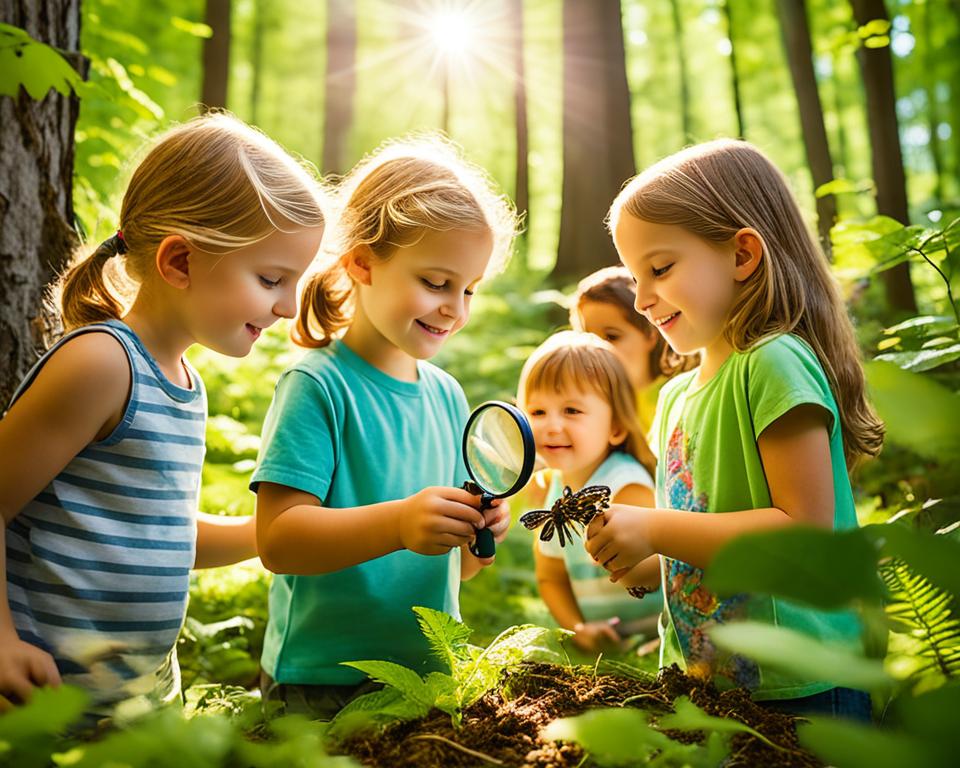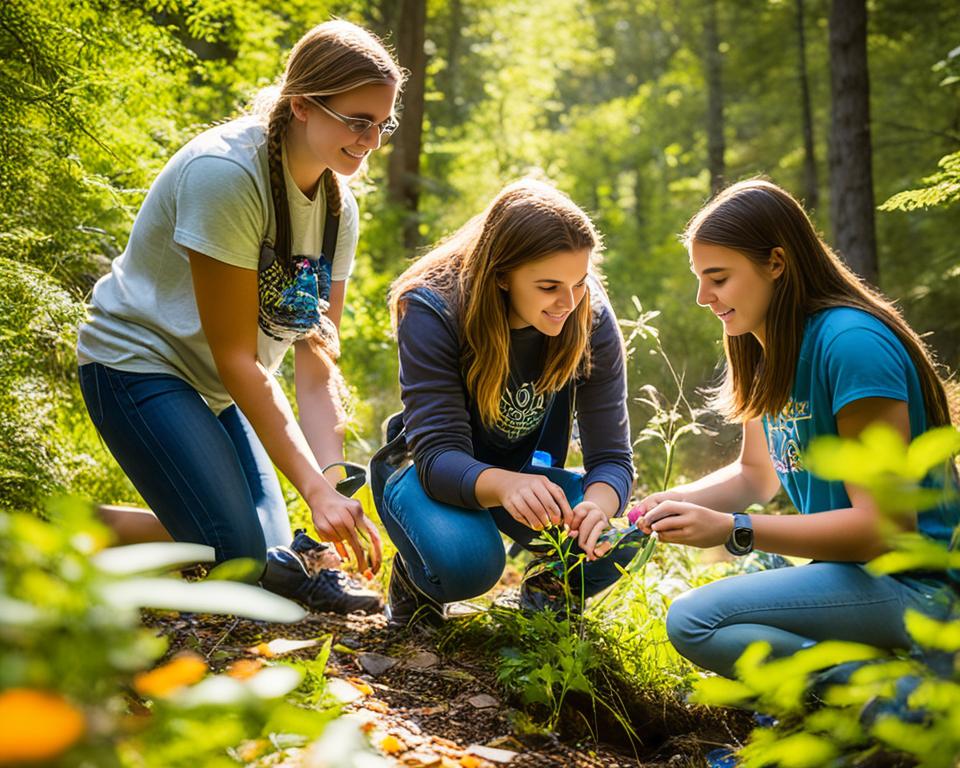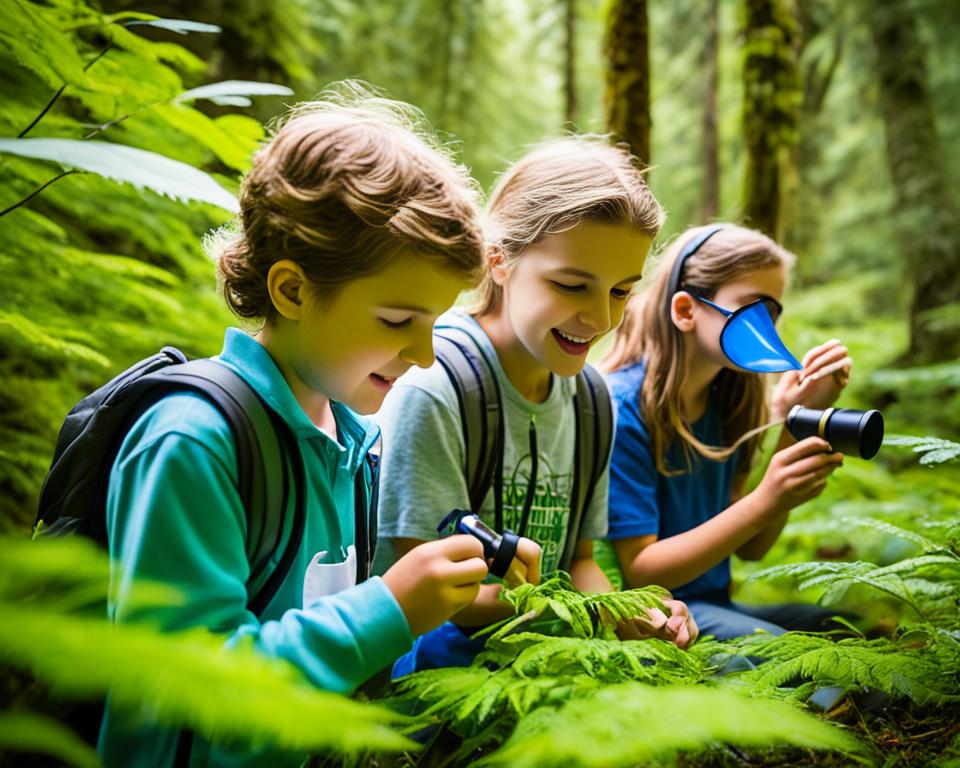In today’s fast-paced and technology-driven world, the value of learning in outdoor settings has become increasingly apparent. Research has shown that outdoor learning not only provides a breath of fresh air but also offers numerous psychological benefits for individuals of all ages. By stepping outside the traditional classroom walls and immersing ourselves in nature, we can unlock a whole new world of immersive and experiential education.
When we engage in outdoor learning adventures, we open ourselves up to a multitude of opportunities for growth and development. From improving memory retention and cognitive skills to reducing stress and anxiety, spending time in nature can have a profound impact on our overall well-being. Whether it’s through hiking, camping, or team-building exercises, each outdoor experience provides a unique opportunity to connect with the natural world and foster a deeper sense of appreciation and connectedness.
In this article, we will explore the various psychological benefits of outdoor learning and delve into the practical implications for formal education systems. We will also examine the shift towards nature-based learning experiences post-pandemic and how educators and policymakers are addressing health and safety concerns. Additionally, we will discuss the spectrum of outdoor education programs and how they cater to different needs and interests.
So join me in this journey as we dive deep into the world of outdoor learning and discover the transformative power it holds for our psychological well-being!
Key Takeaways:
- Outdoor learning offers numerous psychological benefits, including enhanced memory retention and cognitive skills.
- Spending time in nature reduces stress and anxiety while improving overall well-being.
- The COVID-19 pandemic has led to a shift towards nature-based learning experiences in formal education systems.
- Outdoor education programs provide a safer learning environment while allowing students to engage with nature.
- There is a wide range of outdoor education programs available, catering to different interests and goals.
Introduction to Outdoor Learning Adventures
Outdoor learning adventures offer a unique educational experience that takes place in natural environments. These adventures not only encourage individuals to connect with the outdoors but also provide an opportunity to engage in various activities and exercises that promote hands-on learning, skill development, and personal growth.
When participating in outdoor learning adventures, individuals can immerse themselves in nature and explore a wide range of activities. This may include hiking through scenic landscapes, camping under the stars, observing wildlife in their natural habitats, and engaging in team-building activities that foster collaboration and communication. The possibilities are endless, allowing for an exciting and dynamic learning experience.
One of the key benefits of outdoor learning adventures, particularly for children, is the sense of wonder and curiosity that they foster. Being in nature stimulates their imagination and encourages them to explore and discover new things. Outdoor learning engages their senses and enhances their appreciation for the natural world around them.
Moreover, outdoor activities for kids promote physical activity, which is crucial for their development and overall well-being. Research has shown that spending time outdoors and engaging in physical activities can improve children’s motor skills, coordination, and cardiovascular health.
Outdoor learning adventures also support the development of essential life skills, such as problem-solving, decision-making, and resilience. By facing challenges in a natural setting, individuals learn to adapt and find creative solutions. These skills can then be applied to various real-life situations, facilitating personal growth and empowering individuals to navigate the complexities of the modern world.
Overall, outdoor learning adventures provide a rich and immersive learning experience that combines education, nature, and adventure. By stepping outside the traditional classroom, individuals can unlock their full potential and develop a deep connection with the natural world.
Shift Towards Nature-Based Learning Experiences Post-Pandemic
The COVID-19 pandemic has had a profound impact on formal school systems, leading to a significant shift towards nature-based learning experiences. With concerns about indoor gatherings and the transmission of the virus, educators and policymakers have recognized the benefits of utilizing outdoor spaces for educational purposes. This shift has given rise to the increased adoption of outdoor education programs as a means of providing a safer learning environment while allowing students to engage with nature and experience hands-on learning opportunities.
The Rise of Outdoor Education in Formal School Systems
In response to the pandemic, many formal school systems have embraced outdoor education programs as a way to continue delivering quality education while ensuring the health and safety of students. These programs integrate outdoor settings, such as school gardens, nature reserves, or nearby parks, into the curriculum to facilitate interactive learning experiences. By immersing students in natural environments, outdoor education programs not only provide a change of scenery but also promote experiential learning, critical thinking, and problem-solving skills.
Addressing Health and Safety Concerns
While outdoor education programs offer numerous benefits, the health and safety of students remain a top priority. Educators and administrators have implemented various measures to address these concerns and ensure a safe learning environment. This includes the implementation of proper health protocols, such as social distancing, mask-wearing, and hand hygiene. Educators also provide appropriate supervision to ensure student safety during outdoor activities. Additionally, outdoor education programs have adapted activities to minimize risk, choosing those that allow for sufficient distancing and can be conducted safely in open-air settings.

Understanding the Spectrum of Outdoor Education Programs
Outdoor education programs encompass a wide range of approaches and settings. From nature-based education and forest schools to experiential learning and environmental education, these programs provide unique opportunities for learners to engage with the natural world.
The spectrum of outdoor education programs can vary in intensity, duration, and specific focus areas. Some programs focus on skills development and team-building, while others delve into environmental conservation, sustainability, or wilderness survival. Understanding the different types of outdoor education programs allows educators and learners to choose experiences that align with their goals and interests.
Engaging in nature-based education programs allows learners to connect with the environment and develop a deeper understanding of ecological systems. By exploring forests, wetlands, and other natural habitats, participants gain firsthand knowledge of ecosystems and learn about the importance of biodiversity and environmental stewardship.
Experiential learning programs take a hands-on approach, offering interactive activities and real-world applications of knowledge. These programs provide opportunities for learners to develop problem-solving skills, critical thinking abilities, and adaptability in outdoor settings.
Environmental education programs focus on raising awareness and promoting sustainable practices. Participants learn about environmental issues, such as climate change and resource conservation, and are empowered to take action to protect the planet.
Forest schools, inspired by the Scandinavian approach, place an emphasis on play and exploration in natural environments. Children engage in unstructured outdoor activities, fostering creativity, curiosity, and a love for nature.
Overall, the spectrum of outdoor education programs offers diverse learning experiences that cater to various interests and learning styles. By immersing participants in nature and providing hands-on learning opportunities, these programs instill a deep appreciation for the environment and equip individuals with valuable skills for personal and academic growth.
Outdoor Skills Development and Cognitive Benefits
Engaging in outdoor learning experiences contributes to the development of various skills and offers significant cognitive benefits. These experiences provide individuals with opportunities to participate in activities such as navigation, problem-solving, and teamwork in natural settings. Through these activities, critical thinking, decision-making, and adaptability are enhanced, allowing individuals to develop valuable outdoor skills.
Research has shown that learning in natural environments improves learning retention. The contextual and multisensory nature of outdoor settings enhances memory consolidation, leading to enhanced retention of information and skills acquired during outdoor learning adventures. This heightened learning retention is attributed to the unique sensory experiences and rich environmental stimuli present in nature.

Furthermore, the skills gained through outdoor learning experiences are transferable to everyday situations. The practical and real-world application of knowledge and skills acquired outdoors promotes the development of transferable skills. These skills can be applied in various contexts, allowing individuals to effectively navigate different situations they encounter in their daily lives.
By engaging in outdoor learning adventures, individuals not only develop valuable outdoor skills, but they also experience cognitive benefits such as improved memory retention and the ability to transfer skills to everyday situations. These benefits contribute to holistic skill development and enhance individuals’ overall cognitive capabilities.
Embracing Environmental Education Activities for Physical Health
Environmental education activities play a crucial role in fostering a sense of environmental responsibility while promoting physical health. In today’s society, sedentary lifestyles have become prevalent, leading to various health risks. To combat these risks, it is essential to engage in outdoor activities and connect with nature.
Spending time in nature has been associated with increased physical activity and improved cardiovascular health. Whether it’s hiking, gardening, or participating in nature-based games, these activities encourage movement and help individuals break free from the sedentary habits that can negatively impact their well-being.
Moreover, nature exposure has been shown to reduce the risks of obesity and chronic diseases. Being in nature not only encourages physical activity but also provides a refreshing and stimulating environment that can contribute to overall health and vitality.
By incorporating environmental education activities into curricula and encouraging outdoor play, educators can make a significant impact on the physical well-being of learners. Through hands-on experiences in nature, students can develop a deeper connection to the natural world while reaping the benefits of increased physical activity and reduced health risks.
Combatting Sedentary Lifestyles
In today’s digital age, sedentary lifestyles have become a pressing concern. Many individuals spend a significant amount of time sitting, whether it’s at work, school, or during leisure activities. This sedentary behavior can have detrimental effects on physical health and well-being.
Embracing environmental education activities offers a valuable solution to combat sedentary lifestyles. By encouraging individuals to engage in outdoor activities and spend time in nature, we can promote a more active and healthy lifestyle.
Connecting Nature Exposure to Reduced Health Risks
Research has consistently shown the positive impact of nature exposure on reducing health risks. Spending time in natural environments has been linked to improved mental health, reduced stress levels, and better overall well-being. Additionally, the physical activity associated with outdoor activities can lead to improved cardiovascular health, increased fitness levels, and a lower risk of chronic diseases such as heart disease, diabetes, and obesity.
By embracing environmental education activities and promoting nature exposure, we can help individuals mitigate the health risks associated with sedentary lifestyles. The incorporation of nature-based learning experiences into curricula can not only contribute to physical health but also foster a deeper appreciation and understanding of the natural world.
It is crucial that we prioritize environmental education activities for physical health to ensure a sustainable future for both individuals and the planet.
A Dive Into Wilderness Education Programs and Mental Wellness
Wilderness education programs offer transformative experiences that focus on personal growth and mental wellness. These programs combine outdoor adventure activities with therapeutic approaches to help individuals build resilience, improve self-confidence, and develop problem-solving skills.
Participants in wilderness education programs have the opportunity to disconnect from technology and immerse themselves in challenging outdoor environments. This immersion allows them to connect with nature on a deeper level and gain a greater understanding of themselves and their capabilities.
Research has shown that wilderness education programs have a positive impact on mental well-being and can help reduce stress. By engaging in outdoor activities and therapeutic interventions, participants can experience improved mental wellness and a renewed sense of self.
These programs aim to promote personal growth by providing individuals with the tools and skills they need to overcome challenges and face adversity. Through outdoor therapy, participants learn to navigate unfamiliar terrain, communicate effectively, and develop a sense of self-efficacy.
Wilderness education programs are not only beneficial for individuals seeking personal growth and mental wellness but can also be valuable for students, corporate teams, and individuals looking to enhance their leadership and teamwork skills. These programs create opportunities for experiential learning, self-reflection, and self-discovery.

By immersing themselves in nature and engaging in outdoor adventure activities, participants in wilderness education programs can gain a new perspective, develop valuable life skills, and foster a deeper connection to the natural world. These experiences can have a lasting impact on their overall well-being and set them on a path to personal and professional success.
Outdoor Leadership Training and Social Relationship Building
Outdoor leadership training programs provide individuals with unique opportunities to develop leadership skills and build social relationships through collaborative learning experiences. Engaging in activities that require teamwork, communication, and problem-solving fosters the development of essential social skills and improves interpersonal relationships.
During outdoor leadership training, participants work together on challenging tasks and outdoor adventures, such as navigating through unfamiliar terrain, building shelters, or solving complex problems. These collaborative learning experiences create a supportive environment where individuals learn to trust each other, communicate effectively, and leverage their strengths to achieve common goals.
“Outdoor leadership training programs offer a holistic approach to leadership development, combining experiential learning with the transformative power of nature.”
Outdoor leadership programs also play a crucial role in fostering equity in community engagement. They provide equal opportunities for individuals from diverse backgrounds to participate and take on leadership roles. By creating inclusive and culturally aware environments, outdoor leadership training programs promote community-building and empower participants to become leaders in their communities.
Through these programs, participants learn to appreciate and value diversity, engage in collaborative decision-making processes, and respect different perspectives. By breaking down barriers and promoting inclusivity, outdoor leadership training contributes to the development of socially responsible leaders who are equipped to address the complex challenges of our world.
Nurturing Social Skills Through Collaborative Learning
Collaborative learning experiences in outdoor leadership training programs provide a powerful platform for nurturing social skills. Participants learn firsthand the importance of effective communication, active listening, and working together as a team to achieve shared objectives.
Outdoor activities require participants to interact, cooperate, and respect each other’s contributions. Whether it’s navigating a challenging trail, planning a route, or working on a group project, individuals learn to communicate clearly, delegate tasks, resolve conflicts, and support one another in achieving their collective goals.
Collaboration in outdoor leadership training programs promotes empathy, understanding, and mutual respect. Participants learn to appreciate the diverse strengths and perspectives that each individual brings to the team, fostering a culture of inclusivity and teamwork.
Fostering Equity in Community Engagement
Outdoor leadership training programs play a crucial role in fostering equity in community engagement by providing equal opportunities for individuals from diverse backgrounds to participate and lead. These programs prioritize inclusivity and cultural awareness, ensuring that everyone feels welcome and valued.
By engaging individuals from different backgrounds, outdoor leadership training programs contribute to a more equitable and diverse leadership landscape. Participants gain valuable skills and experiences that prepare them to take on leadership roles in their communities, creating a more representative and inclusive society.
Furthermore, outdoor leadership training programs actively work to break down barriers and address systemic inequalities. They aim to bridge the gap between different social groups, enabling individuals from underrepresented communities to access leadership development opportunities and contribute to community initiatives.
Outdoor leadership training programs promote community-building through shared experiences and collaborative problem-solving. By providing a platform for individuals to connect, learn from one another, and develop meaningful relationships, these programs foster a sense of belonging and empower participants to make positive changes in their communities.
Experiential Outdoor Education: Harnessing Local Partnerships and Resources
Experiential outdoor education takes learning beyond the four walls of the classroom, offering hands-on experiences that immerse students in their surrounding environment. A key aspect of this approach is harnessing local partnerships and resources to create resourceful learning environments that foster meaningful connections between students and their community.
By collaborating with local organizations, parks, and community members, educators can provide unique educational experiences that integrate real-world knowledge and local expertise. This partnership allows students to gain a deeper understanding of their local ecosystem, culture, and history, making their learning more relevant and engaging.
Community integration plays a vital role in experiential outdoor education. By involving the local community, students can develop a sense of place and a greater appreciation for the natural wonders and heritage of their surroundings. This connection with the community encourages students to become stewards of their environment and instills a sense of pride in their local area.
In implementing experiential outdoor education, educators face various challenges, including logistical considerations, securing funding, and integrating the curriculum seamlessly. However, these challenges can be overcome with creative approaches. Educators can leverage local partnerships to access resources and expertise, find innovative ways to address logistical constraints, and collaborate with other educators to develop interdisciplinary curricula that integrate outdoor learning experiences.
Overall, experiential outdoor education offers a rich and immersive learning experience that connects students with their community and environment. By harnessing local partnerships, educators can create resourceful learning environments that enhance students’ understanding, engagement, and appreciation of the world around them.

The Impact of Outdoor Team Building Activities on Student Wellbeing
Outdoor team building activities have a significant impact on student wellbeing by promoting the development of social-emotional skills and enhancing self-esteem. Engaging in collaborative problem-solving, communication exercises, and trust-building activities outdoors helps students build relationships, develop empathy, and improve self-confidence. These activities create a supportive and inclusive environment where students feel valued and connected to their peers. Outdoor team building activities contribute to a positive school climate and foster a sense of belonging, leading to improved overall student wellbeing.
Research indicates that participating in outdoor team building activities can have a positive effect on students’ social-emotional development. Collaborative problem-solving exercises encourage students to work together, communicate effectively, and build trust with their peers. Through these activities, students learn valuable skills such as teamwork, leadership, and conflict resolution, which are essential for success in both academic and personal settings.
Moreover, the outdoor environment itself provides a unique and stimulating space for students to engage in team building activities. Being outdoors allows students to escape the confines of the classroom and experience a sense of freedom and adventure. This change of scenery can inspire creativity, encourage risk-taking, and promote a sense of excitement and enthusiasm among students.
The self-esteem of students is also positively influenced by participating in outdoor team building activities. By successfully completing challenges and tasks as a team, students gain a sense of accomplishment and pride in their abilities. This boost in self-confidence carries over to other areas of their lives, leading to improved motivation, resilience, and a willingness to take on new challenges.
In addition to the direct benefits of social-emotional development and enhanced self-esteem, outdoor team building activities contribute to the overall wellbeing of students. These activities promote physical activity, which has been linked to improved mental health and academic performance. The fresh air, natural surroundings, and physical exertion inherent in outdoor team building activities can reduce stress, increase energy levels, and improve mood.
Overall, incorporating outdoor team building activities into educational programs provides students with a unique opportunity to develop social-emotional skills, enhance self-esteem, and improve overall wellbeing. These activities foster collaboration, build positive relationships, and create a supportive learning environment where students can thrive. By recognizing the importance of outdoor team building activities, schools can prioritize the holistic development of students and nurture their overall wellbeing.
Table:
| Benefits of Outdoor Team Building Activities on Student Wellbeing: |
|---|
| Promotes the development of social-emotional skills |
| Enhances self-esteem |
| Builds relationships and empathy |
| Creates a supportive and inclusive environment |
| Contributes to a positive school climate |
| Boosts motivation and resilience |
| Reduces stress and improves mood |
| Encourages physical activity |
| Provides a unique and stimulating learning environment |
Nurturing a Nature Exploration Focused Learning Curriculum
Nurturing a nature exploration-focused learning curriculum involves integrating nature-based activities, biodiversity awareness, and hands-on experiences into educational programs. By incorporating outdoor learning opportunities and providing hands-on experiences with flora, fauna, and natural habitats, educators can enhance students’ understanding of the environment and foster a sense of curiosity.
Biodiversity Awareness and Hands-On Experiences
Biodiversity awareness is essential in nurturing an appreciation for the interconnectedness of ecosystems and the importance of conservation. Through hands-on experiences, students can actively engage with the natural world, observe diverse species, and learn about the delicate balance of ecosystems. By studying and exploring biodiversity, students not only gain knowledge but also develop a sense of responsibility towards the environment and a desire to protect it for future generations.
The Role of Nature Connection in Enhanced Learning
Nature connection plays a crucial role in enhanced learning outcomes. When students have a strong connection with nature, they are more engaged, motivated, and curious about the subjects they are studying. Spending time in natural environments stimulates the senses, sparks creativity, and encourages a deeper understanding of academic concepts. Nature-based learning experiences also provide opportunities for interdisciplinary learning, as students can explore subjects such as science, ecology, art, and literature through a lens of nature exploration.

Emphasizing nature exploration in the learning curriculum not only enhances academic achievement but also nurtures students’ love for the natural world. Through hands-on experiences and biodiversity awareness, students develop a deeper appreciation for the environment and a desire to protect it. Nature connection enriches the learning process, fostering engagement and intrinsic motivation. By integrating nature-based activities and providing opportunities for hands-on experiences, educators can create a holistic learning environment that nurtures curiosity, enhances learning outcomes, and cultivates a lifelong connection with the natural world.
Conclusion
In conclusion, exploring the psychological benefits of learning in outdoor settings reveals the immense value of outdoor learning adventures, nature-based education, and experiential learning. These experiences not only provide cognitive, physical, and social-emotional benefits but also contribute to overall well-being. The post-pandemic shift towards nature-based learning experiences has emphasized the importance of outdoor education programs, which address health and safety concerns while offering immersive learning opportunities in natural environments.
By embracing environmental education activities, wilderness education programs, and outdoor leadership training, individuals can enhance their mental wellness, develop essential skills, and build meaningful social relationships. Environmental education fosters a sense of environmental responsibility while promoting physical health. Wilderness education programs focus on personal growth and mental wellness by immersing participants in challenging outdoor environments. Outdoor leadership training promotes social relationship building through collaborative learning experiences.
Experiential outdoor education harnesses local partnerships and resources to create resourceful learning environments. Despite the challenges faced by educators, such as logistics, funding, and curriculum integration, creative approaches and partnerships help overcome these obstacles. Outdoor team building activities contribute to student well-being by fostering social-emotional skills and enhancing self-esteem. Additionally, a nature exploration-focused learning curriculum nurtures biodiversity awareness, hands-on experiences, and the role of nature connection in enhanced learning outcomes.
This exploration of the psychological benefits of learning in outdoor settings highlights the need for continued integration of outdoor learning into formal education systems. Doing so promotes holistic development and creates a deeper connection to nature, paving the way for a brighter future where individuals can thrive academically, emotionally, and physically.
